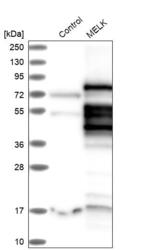Antibody data
- Antibody Data
- Antigen structure
- References [6]
- Comments [0]
- Validations
- Western blot [1]
Submit
Validation data
Reference
Comment
Report error
- Product number
- HPA017214 - Provider product page

- Provider
- Atlas Antibodies
- Proper citation
- Atlas Antibodies Cat#HPA017214, RRID:AB_1853798
- Product name
- Anti-MELK
- Antibody type
- Polyclonal
- Description
- Polyclonal Antibody against Human MELK, Gene description: maternal embryonic leucine zipper kinase, Alternative Gene Names: KIAA0175, Validated applications: WB, IHC, Uniprot ID: Q14680, Storage: Store at +4°C for short term storage. Long time storage is recommended at -20°C.
- Reactivity
- Human
- Host
- Rabbit
- Conjugate
- Unconjugated
- Isotype
- IgG
- Vial size
- 100 µl
- Concentration
- 0.1 mg/ml
- Storage
- Store at +4°C for short term storage. Long time storage is recommended at -20°C.
- Handling
- The antibody solution should be gently mixed before use.
Submitted references Maternal Embryonic Leucine Zipper Kinase Promotes Tumor Growth and Metastasis via Stimulating FOXM1 Signaling in Esophageal Squamous Cell Carcinoma
Upregulated MELK Leads to Doxorubicin Chemoresistance and M2 Macrophage Polarization via the miR-34a/JAK2/STAT3 Pathway in Uterine Leiomyosarcoma
Inhibition of MELK Protooncogene as an Innovative Treatment for Intrahepatic Cholangiocarcinoma
Identification of potential therapeutic targets in prostate cancer through a cross‐species approach
The microRNA expression signature of small cell lung cancer: tumor suppressors of miR-27a-5p and miR-34b-3p and their targeted oncogenes
Impact of novel miR-145-3p regulatory networks on survival in patients with castration-resistant prostate cancer
Chen L, Wei Q, Bi S, Xie S
Frontiers in Oncology 2020;10
Frontiers in Oncology 2020;10
Upregulated MELK Leads to Doxorubicin Chemoresistance and M2 Macrophage Polarization via the miR-34a/JAK2/STAT3 Pathway in Uterine Leiomyosarcoma
Zhang Z, Sun C, Li C, Jiao X, Griffin B, Dongol S, Wu H, Zhang C, Cao W, Dong R, Yang X, Zhang Q, Kong B
Frontiers in Oncology 2020;10
Frontiers in Oncology 2020;10
Inhibition of MELK Protooncogene as an Innovative Treatment for Intrahepatic Cholangiocarcinoma
Cigliano A, Pilo M, Mela M, Ribback S, Dombrowski F, Pes G, Cossu A, Evert M, Calvisi D, Utpatel K
Medicina 2019;56(1):1
Medicina 2019;56(1):1
Identification of potential therapeutic targets in prostate cancer through a cross‐species approach
Jurmeister S, Ramos‐Montoya A, Sandi C, Pértega‐Gomes N, Wadhwa K, Lamb A, Dunning M, Attig J, Carroll J, Fryer L, Felisbino S, Neal D
EMBO Molecular Medicine 2018;10(3)
EMBO Molecular Medicine 2018;10(3)
The microRNA expression signature of small cell lung cancer: tumor suppressors of miR-27a-5p and miR-34b-3p and their targeted oncogenes
Mizuno K, Mataki H, Arai T, Okato A, Kamikawaji K, Kumamoto T, Hiraki T, Hatanaka K, Inoue H, Seki N
Journal of Human Genetics 2017;62(7):671-678
Journal of Human Genetics 2017;62(7):671-678
Impact of novel miR-145-3p regulatory networks on survival in patients with castration-resistant prostate cancer
Goto Y, Kurozumi A, Arai T, Nohata N, Kojima S, Okato A, Kato M, Yamazaki K, Ishida Y, Naya Y, Ichikawa T, Seki N
British Journal of Cancer 2017;117(3):409-420
British Journal of Cancer 2017;117(3):409-420
No comments: Submit comment
Enhanced validation
- Submitted by
- Atlas Antibodies (provider)
- Enhanced method
- Recombinant expression validation
- Main image

- Experimental details
- Western blot analysis in control (vector only transfected HEK293T lysate) and MELK over-expression lysate (Co-expressed with a C-terminal myc-DDK tag (~3.1 kDa) in mammalian HEK293T cells, LY402376).
- Sample type
- Human
- Protocol
- Protocol
 Explore
Explore Validate
Validate Learn
Learn Western blot
Western blot Immunohistochemistry
Immunohistochemistry